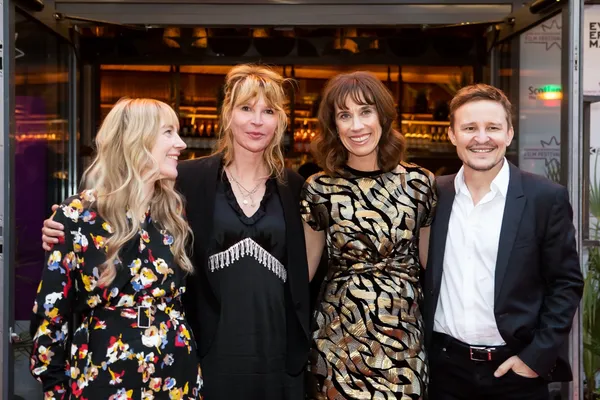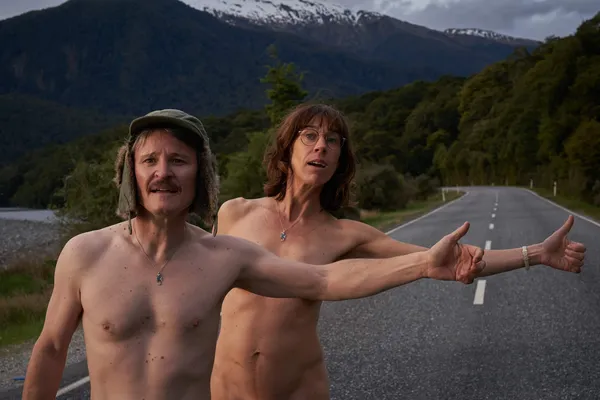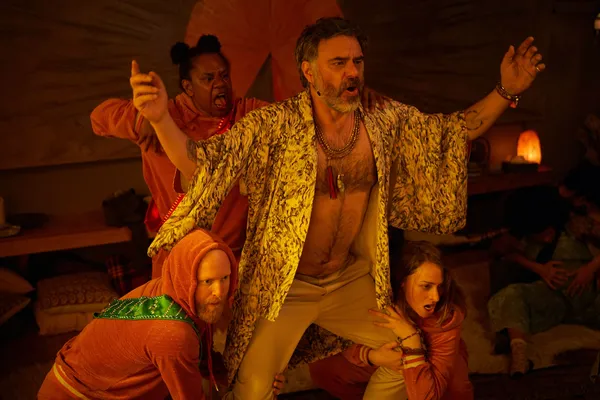 |
| Armagan Ballantyne, Jackie van Beek, Julia Davis, Damon Herriman in Edinburgh for the gala screening of Nude Tuesday Photo: Pako Mera |
Antipodean comedy Nude Tuesday - which was the Centrepiece Gala at this year's Edinburgh International Film Festival - doubles down on improvisation. Its tale of a couple, Laura (Jackie van Beek) and Bruno (Damon Herriman), who go on a sex retreat run by guru Bjorg (Jemaine Clement) in a bid to save their marriage, sees the cast, improvising around a basic script devised by van Beek, all speaking made up gibberish. Once the film, directed by Armagan Ballantyne, was complete, they handed the version that screened in Edinburgh to Julia Davis, who created her own set of subtitles based purely on what she saw. It's a tricky task for actors, filmmaker and writer and I caught up with van Beek, Herriman, Ballantyne and Davis ahead of the Edinburgh screening to chat about playing with language and playing off each other.
Amber Wilkinson: When you're doing something like this, how you rehearse it in terms of prepping the scenes, because it's very improvised when you're doing it but there must have to be quite a bit of structure there as well.
Jackie van Beek: Armagan and I created the story and came up with the gibberish idea. And then I was the screenplay writer. So I spent five years writing the screenplay, and was convinced after a year of writing asterisks to actually write temporary English dialogue, so that we knew what we were doing. And Julia wrote the subtitles - we've got two versions and Julia's version is playing here.
Armagan Ballantyne: What was really useful was Jackie's great script that we didn't end up using on that film - the dialogue that was never heard. But it was really useful for rehearsals and understanding the characters' beats and arcs more deeply
JvB: So we had a whole script and the whole story was structured, and every scene had a structure to it, so we would all rehearse in English with the English dialogue, and then Armagan would flip us into gibberish and roll the camera. But we all knew the structure and the story of it and the driving forces within each scene. So there was quite a lot of structure.
 |
| Damon Herriman and Jackie van Beek in Nude Tuesday. Van Beek: 'One of our agendas was to try to normalise nudity in our part of the world' Photo: Kerry Brown |
Damon Herriman: So we were improvising in the sense that we were making up the gibberish. But we weren't really making up the dialogue, we were thinking about the lines that Jackie had written as we were playing the scene. Also, knowing that those lines meant nothing because, A. They sound like gibberish and B. They'd be rewritten by Julia anyway.
AW: To what degree are you aware of the fact that you could be about to make your co-star laugh, because it's quite a serious enterprise but at the same time, you're trying to generate humor through the language. So I was thinking that would be quite a difficult balancing act, without setting one another off.
JvB: We set each other off a lot. Yeah, especially, especially at the start, there was one particular scene where I was directing Damon, Jemaine and myself, it's that scene where we're kind of in therapy. The three of us laughed so hard it's incredible that Armagan was able to cut it together, she just cut around the laughter.
AB: What you see is all I could get. I think one of the beautiful gifts of the gibberish language was that it was so funny. It was such an absurd quality to it when you perform it. We did this little scene to try to show proof of concept, to show people what we're kind of trying to raise money and stuff. And the very first time Jackie had a go of it she was quite familiar with the language and how it should sound and as soon as it came out of her mouth, and she was improvising with Damon, he was on the floor in hysterics.
DH: I think for a second I was scared that we weren't gonna get to film anything because I thought, "I can't stop laughing".
JvB: I'd turn round and find him in a ball shaking with laughter.
AB: I find it a very playful ingredient.
JvB: With any comedy that I've been in there's a lot of laughing if you've got the chemistry with the other actors and you're creating comedy, especially if it's improvised, there's so much laughing because it's so surprising because you don't know what the other person is going to do or say. And usually it's hilariously funny, which is brilliant, but it's very hard not to laugh.
AW: In a way, Julia, you are creating your own free jazz improvising over the top of what has already been improvised. So how did you feel when they came to you with the project?
Julia Davis: I loved it. I was a big fan. It was really exciting, as an experiment, which is what it felt like initially.
JvB: And it was so wild, because we didn't give Julia our script at all, just the finished film, with no subtitles. And it was so wild for Armagan - it was nothing like I'd written. Especially my own character's backstory - Julia wrote a whole new backstory for me. I had not written the fact that my character had had a Christmas anal fling. When I saw it, I thought, "I did not perform my character like an adulterer. In my mind, I'm like a Christian." And I loved that.
AW: There's another version as well, which I've not seen and I'm quite curious - is it quite a different experience watching it?
JvB: It totally is and both versions end differently. Yet it feels truthful in both versions, which is amazing. I guess the other version is slightly more similar to what I had written although, of course, there's completely different words.
JD: I haven't seen that version.
AW: I feel like this film could have a whole afterlife of people doing their own versions. You're almost opening the door to that.
JvB: Yes, totally. Armagan and my vision was we've set up this template and on our budget, we could do two versions. I love the idea that one day it could just be free for like hungover university lecturers to say, "Just subtitle Nude Tuesday and hand it in on Friday." I love that people could use it. But I guess with all the licensing and stuff when you've just made it, you know, it's difficult, but one day, I hope it is free for anyone.
 |
| Damon Herriman and Jackie van Beek in Nude Tuesday. Van Beek: 'One of our agendas was to try to normalise nudity in our part of the world' Photo: Kerry Brown |
AW: As the title suggests, there's quite a lot of nudity in this film, when you finally get to it. It's interesting because it's very body positive, which is quite unusual, especially in a comedy film. Comedy history is littered with either Carry On style perfect physiques or the whole point of being naked is that it's funny because they're naked, and they look different. Whereas this film is very body positive about that. Also, how did you go about shooting the nude scenes and getting people relaxed enough to do them, especially given that presumably, the conditions were fairly challenging up on a cold mountain?
JvB: There was some chat about shrinkage, there was a bit of nervousness.
AB: When we went out to actors or invited them to audition everyone knew what it might entail so we were very upfront with it. And then once people were cast, having conversations with them, finding out what people's boundaries were and what they're comfortable with. We were very up front - this is the approach that we want to take with the film and with the nudity, we didn't want to sexualize it. We wanted it to be, as you say, body positive and very much about these humans in the landscape. The nakedness was unsexual. It's funny because we've got sex scenes in the film but everyone's clothed. So we worked with a great intimacy coordinator, because it's such a big cast, to make sure everyone felt like they had someone to talk to. Ultimately, even though it was challenging for the actors, because for a lot of them it was the first time they've been naked on screen, they wanted to do and, and found it quite cathartic. And after the fact, the actors would be going down and skinny dipping in the pool because they felt quite liberated. That was the most thrilling thing, where people felt like it was something that was a positive experience and that was really important to us.
JvB: One of our agendas was to try to normalise nudity in our part of the world, Australia. We love watching Scandinavian films, European films, and nudity is much more normalised in those cultures. So we wanted to celebrate nudity. We cast, you know, the best improvisers and actors, rather than casting for body shape, and it is so nice to see all those different shapes of people.
AW: This version of the film is hopeful about humanity despite the mayhem that's going on. So, Julia, you take the film and you go away and write and then you give it back to them. That must be quite a moment, because you must be nervous about their reaction?
JD: But they were so encouraging all the way along and I suppose I sent bits along the way. So there was a general sense of, "Just go for it". But, of course, I was constantly not wanting to let them down.
AW: How do you find watching it with an audience?
DH: It's an amazing experience. The first time I saw it was at the premiere at the Sydney Film Festival. It was unlike any other first time seeing anything that I've been in, because I didn't know what I was going to say. I knew the scenes we shot and remembered what we did in them.
 |
| Jemaine Clement in Nude Tuesday. Jackie van Beek: 'He's a very strong improviser and that's where he comes into his own' Photo: Kerry Brown |
But I knew that what I thought I was saying was going to be completely different. So I was kind of hanging on every moment to see what I would say next. It was an amazing experience, so funny. I was just laughing my head off. I felt because I was laughing so much at stuff I said because of Julia's dialogue, not because of my performance. I thought people must be thinking, "God, he thinks he's pretty funny".
AW: Obviously you gathered a certain number of words across the shoot, like "chula" for thanks.
JvB: Yes, that was just to anchor the language into something that felt real. So we ended up having eight or nine as well as all of the names of the characters.
DH: Yes, no, hello, goodbye, please, thank you, sorry. Partly because we knew that if you were improvising something like "hello", and there were 25 different hellos, it would just be weird to have that many different words for it.
AW: In some scenes you can see you are feeding off one another so that if one of you uses one phrase, another person will use the same phrase in order to keep the consistency. Does not having a script make you more engaged with the work because you have to be so responsive?
JvB: This is what I love about because I do a lot of improv anyway and what I love about it is you have to be so keyed in to your other actors, because you don't know what they're going to give you. Everyone has to be so present. So it really felt like an energetic exchange. To listen and energetically respond, it was just heaven for me. Also we didn't have to memorise our lines every night, we could just go to the pub.
AW: And how do you know when you've 'got' the scene.
AB: You know what sort of emotional tensions you're exploring in the scene. So it wasn't so about the dialogue but more about the emotional exchanges and what was going on between the characters and them feeling authentic, alive and vital. We had rehearsal time during which we spent a good chunk of time on the language so that wasn't a hurdle would have to kind of get over when we're shooting.
DH: We'd be improvising scenes that weren't even in the film in English. And then we'd do the same scene again in gibberish.
AW: I could see that working, because it would give you just that a bit more structure.
JvB: Well, you need that confidence. As an actor, you want to feel confident with the language, so then you can kind of just act freely in character and play. In those first few days of rehearsal, we're all stumbling with the language and you know, the actors, including myself, saying "God, does that sound all right?" You don't want to feel like that on set so we all had to get really confident, so then we could just play.
AW: Was it at all competitive? Also, Jemaine Clement is quite experienced in terms of improvisation so he must have been handy to have about because I suppose he'd be naturally quite confident.
JvB: He and I have worked together a lot on What We Do In The Shadows and then his spin offs. He's a very strong improviser and that's where he comes into his own.
DH: Your point about being competitive, I think that sort of thing could have happened if there hadn't been a script, if it was just like, "Okay, this is a scene with you three in this room", then you could have a thing of people hogging it but because we had the dialogue, there was there was no opportunity to do that anyway, because Jackie had written a script and we were pretty much, in our heads, following the lines as as they went in the script, so there was no sort of like going off and doing your own monologue.
JvB: Jemaine was the only one we allowed to use English. When he came down, we'd already been working for a week, and he did start throwing in some English words with an accent like "Maximum arousal". All the actors thought it was so funny that the next day everyone started doing it and we had to lay down the law. Only Jemaine is allowed to do that because he's a guru - so he did get some special privileges. We thought, for his character, he'd be kind of showing off his ability in English and that he'd travelled.





















